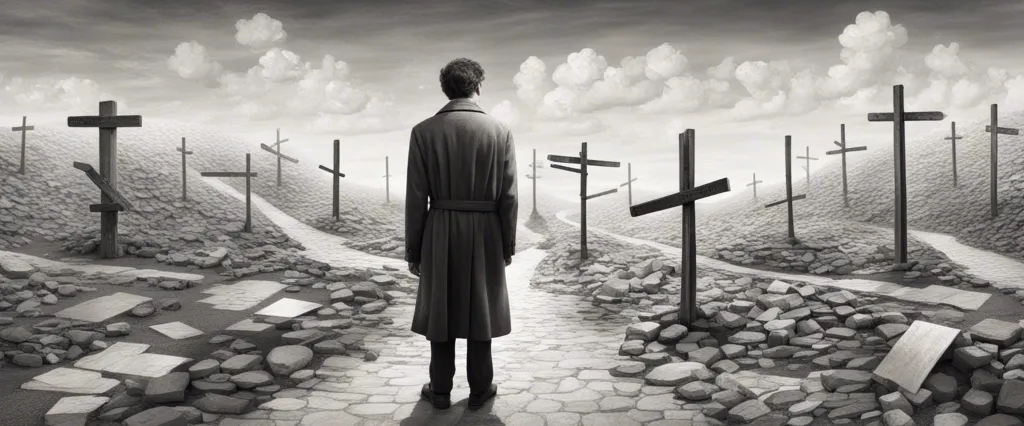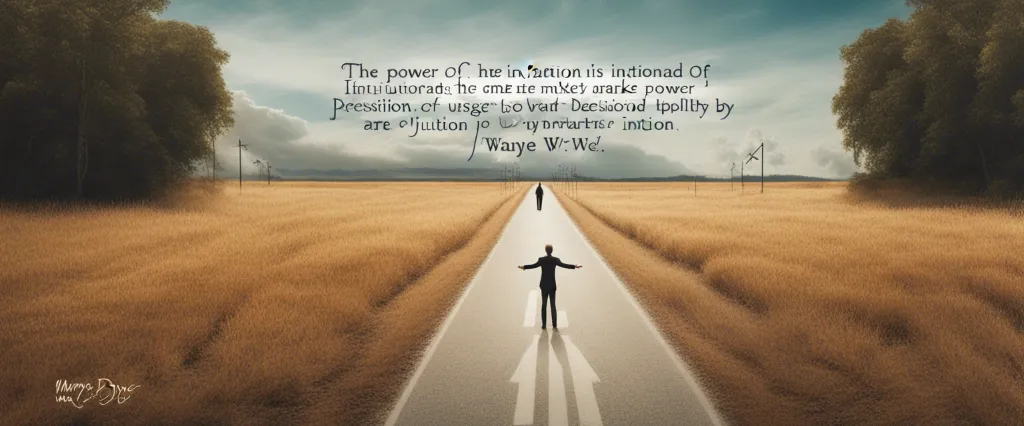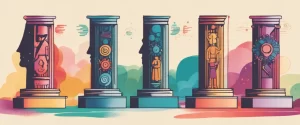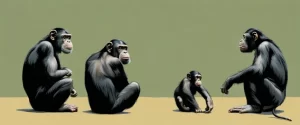——The Power of Intention by Wayne W Dyer & To Have or To Be by Erich Fromm

In the vast realm of self-improvement and personal growth, two prominent authors have graced the literary world with their profound insights. Wayne W. Dyer’s “The Power of Intention” and Erich Fromm’s “To Have or To Be” are like guiding beacons, illuminating the path towards self-discovery and achieving a more fulfilling life. As separate entities, they hold their own unique perspectives and philosophies. Yet, by examining them side by side, we delve into a comparative study that unveils the converging and diverging principles within their respective works.
Wayne W. Dyer, a renowned American self-help author, delves into the transformative power of intention in his seminal work. Embracing the notion that our thoughts create our reality, Dyer emphasizes the significance of aligning our intentions with harmony, love, and understanding. He invites readers to harness their internal power, asserting that intention serves as the catalyst for transforming dreams into tangible achievements. Dyer’s book offers an array of real-life examples, strategies, and practical exercises, providing readers with the tools to tap into the infinite potential of intention and manifest their deepest desires.
Erich Fromm, a distinguished psychoanalyst and social philosopher, presents an equally compelling perspective in “To Have or To Be.” Within its pages, Fromm challenges the consumerist culture that permeates modern society, prompting readers to reevaluate their relationship with material possessions and embrace a more meaningful existence. Fromm navigates the dichotomy between having and being, highlighting the drawbacks of excessive materialism while advocating for a shift towards cultivating authentic connections, spiritual growth, and personal fulfillment. In his exploration, Fromm questions the societal constructs that prioritize accumulation over genuine human experiences, urging readers to discover the transformative potential nestled within the realm of being.
Though each book encapsulates a distinct outlook on the pursuit of a purposeful life, it is through this comparative study that we seek to uncover the underlying thread that weaves these philosophies together. We shall analyze the intricate nuances, commonalities, and differences of Dyer and Fromm’s works, shedding light on the complementary nature of their teachings and their potential to revolutionize the way we perceive ourselves and our place in the world.
Through this comparative exploration, we embark upon a journey that transcends the boundaries of self-help literature. Together, we shall uncover the wisdom bestowed by these two luminaries — enlightening our path towards self-awareness, personal growth, and a more fulfilling existence.
Brief Summary of Two Books
The Power of Intention by Wayne W Dyer
The Power of Intention by Wayne W. Dyer is a self-help book that explores the concept of intention and its impact on personal and professional success. Dyer emphasizes the power of connecting with the universe and harnessing the energy of intention to manifest desires and create a fulfilling life. He explains how intention can be used to overcome obstacles, attract abundance, improve relationships, and cultivate a sense of purpose. Through anecdotes, practical exercises, and spiritual insights, Dyer provides guidance on how to align oneself with the universal energy of intention and live a more purpose-driven and intentional life.
To Have or To Be by Erich Fromm
To Have or To Be” is a philosophical book written by psychoanalyst and social philosopher Erich Fromm. In this book, Fromm critically examines the prevailing materialistic and consumer-driven culture and explores the concepts of “having” and “being” as two distinct modes of existence.
Fromm argues that the predominant focus on material possessions and accumulation in modern society leads to a sense of alienation, emptiness, and a constant search for external validation. He contrasts this with the concept of “being,” which emphasizes the development of one’s inner self, meaningful relationships, and a deeper connection with the world.
The author delves into the historical and psychological factors that have contributed to the dominance of the “having” mode, such as the rise of capitalism and the industrial revolution. He suggests that society’s overwhelming pursuit of having more and more has hindered the development of individual potential, creativity, and human values.
Fromm also explores the consequences of this materialistic orientation, including the exploitation of nature, the erosion of social bonds, and the rise of loneliness and anxiety. He presents various examples from literature, religion, and philosophy to illustrate the superiority of the “being” mode.
Ultimately, Fromm challenges readers to shift their focus from acquiring possessions and social status to seeking self-fulfillment, personal growth, and a sense of oneness with others and the world. He encourages a more mindful, empathetic, and active approach to life that prioritizes inner richness and the search for meaningful experiences.
Comparison between Two Books

Similarities in Psychology
Both “The Power of Intention” by Wayne W Dyer and “To Have or To Be” by Erich Fromm offer psychological insights and concepts that are relevant to personal growth and development.
1. Focus on the Individual: Both books emphasize the importance of understanding oneself and one’s thoughts, beliefs, and desires. They encourage readers to delve into their own psychology, introspect, and develop self-awareness. Both Dyer and Fromm argue that personal growth and transformation begin with an understanding of one’s internal world.
2. A Shift in Perspective: Both authors suggest that a shift in perspective is necessary for personal transformation. Dyer emphasizes the power of intention, stating that by focusing our thoughts and desires on what we want to manifest in our lives, we can bring about positive change. Fromm, on the other hand, proposes a shift from a materialistic and possessive mindset to a more being-oriented mindset, where individuals focus on personal growth and fulfillment instead of acquiring possessions.
3. Connection between Mind and Body: Both books highlight the connection between the mind and body. Dyer discusses the power of visualization and positive thinking, explaining how our thoughts and beliefs impact our physical reality. Fromm explores the concept of being in touch with oneself in a holistic manner, emphasizing the importance of nurturing both physical and mental well-being.
4. The Role of Self-Love: Both authors emphasize the significance of self-love and self-acceptance. Dyer encourages readers to cultivate self-love by recognizing their own worth and practicing self-care. Fromm argues that true self-love comes from the willingness to honestly confront oneself and embrace all aspects of who we are, including our flaws and imperfections.
5. Personal Responsibility: Both books stress the importance of taking personal responsibility for one’s life and choices. Dyer promotes the idea that we have the power to shape our own reality through our intentions and choices. Fromm emphasizes that individuals have the responsibility to actively engage in their own personal growth and create a life that aligns with their values and authentic self.
In summary, both “The Power of Intention” and “To Have or To Be” share similarities in their focus on self-understanding, the importance of perspective, the mind-body connection, the role of self-love, and personal responsibility. These psychological concepts are presented in both books as pathways to personal growth, fulfillment, and living a more authentic life.
Divergences in Psychology
The Power of Intention by Wayne W Dyer and To Have or To Be by Erich Fromm are both influential books that explore different aspects of psychology and personal development. While they share a common interest in human behavior and self-improvement, they diverge in their approaches, concepts, and perspectives on psychology.
In The Power of Intention, Wayne Dyer focuses on the concept of intention and its transformative power in a person’s life. He argues that by aligning one’s thoughts and desires with the energy of intention, individuals can manifest their desires and achieve success. Dyer emphasizes the importance of positive thinking, visualization, and connecting with the higher consciousness to tap into the power of intention. This book highlights the significance of personal responsibility, self-belief, and spiritual connection in shaping one’s reality.
On the other hand, To Have or To Be by Erich Fromm delves into the analysis of modern society and its impact on individual psychology. Fromm explores the societal pressure to constantly strive for material possessions and external success, which he refers to as the “having mode” of existence. He contrasts this with the “being mode” of existence, which emphasizes the cultivation of psychological well-being, personal growth, and connection to others. Fromm argues that the focus on acquiring and possessing material things has led to a sense of alienation, emptiness, and unhappiness in individuals. Instead, he suggests that adopting a more mindful, authentic, and connected approach to life can lead to true fulfillment.
While both books touch upon personal development and psychology, they differ in their approaches. The Power of Intention leans toward a more spiritual and metaphysical perspective, highlighting the role of intention and higher consciousness in shaping one’s reality. It encourages individuals to harness their thoughts and desires to create positive outcomes. In contrast, To Have or To Be takes a sociocultural approach, critiquing the materialistic values of modern society and advocating for a shift towards a more fulfilled and connected way of being.
In summary, The Power of Intention by Wayne W Dyer focuses on personal transformation through intention and spiritual connection, while To Have or To Be by Erich Fromm explores the societal influence on individual psychology and the need for a shift from materialism to a more authentic way of living. These books diverge in their concepts, perspectives, and directions for personal growth, offering readers different insights into the realm of psychology.

Conclusion
Both “The Power of Intention” by Wayne W. Dyer and “To Have or To Be” by Erich Fromm offer valuable insights and are well worth reading, but the choice ultimately depends on personal preferences and interests.
“The Power of Intention” explores the concept of intention and its influence on shaping our lives. Dyer emphasizes the power of positive thinking, manifestation, and living with a clear purpose. The book provides practical exercises and examples to help readers align their thoughts and actions with their intentions, encouraging personal growth and fulfillment.
On the other hand, “To Have or To Be” delves into the fundamental question of what truly brings happiness and fulfillment in life. Fromm contrasts the materialistic and consumer-driven lifestyle of “having” with the more meaningful, experiential approach of “being.” The book critiques the modern capitalist society’s focus on possessions and encourages readers to seek personal authenticity, connection, and spiritual growth.
Ultimately, the selection between the two books depends on the reader’s interests and what they are seeking at the moment. If you are more interested in exploring the power of positive thinking and aligning your intentions with action, “The Power of Intention” can be a great choice. However, if you prefer a more philosophical exploration of the meaning of life and finding fulfillment through self-awareness and connection with others, “To Have or To Be” may be the better option.


